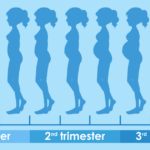Aches And Pains During Pregnancy
Your body will go through a lot of changes during pregnancy as your baby grows. Your hormones also change during this period. Apart from some common symptoms during pregnancy, you will also have some aches and pains.
Headaches
Headaches are common during pregnancy. Taking headache medicines (acetaminophen), rest, and some relaxation techniques can help relieve your headache. Don’t forget to inform your OB/GYN before taking any medicine. If your headaches get worse and don’t go away despite resting and taking medicines to call your OB/GYN. Persistent headaches can be a sign of preeclampsia (high blood pressure during pregnancy), especially toward the end of your pregnancy.
Lower Abdomen or Groin Pain
Pain in the lower abdomen or groin most often occurs between 18 and 24 weeks. When you feel this pain or stretching, move slowly or change positions.
Mild aches and pains lasting for short periods of time are normal. Persistent, severe abdominal pain, or if your pain is accompanied by bleeding or have a fever, it could be a sign of possible contractions. Call and see your OB/GYN right away. These symptoms can indicate more severe problems, such as:
- Preterm labor
- Placental abruption (separation of the placenta from the uterine lining)
- Appendicitis
- Gallbladder disease
Numbness and Tingling
As your pregnancy progresses, you may have some numbness and tingling in your legs and toes. You may have feelings of pins and needles. This happens due to the expanding uterus pressing on the nerves in your legs. This is normal and will go away in a few weeks to months after delivery.
There may also be numbness and tingling in your fingers and hands. You may have this mostly when you wake up in the morning. This will also go away after delivery. Sometimes, it may take a few weeks to months for this to go away.
If you feel uncomfortable, ask your OB/GYN to recommend a brace at night for relief.
Call your OB/GYN and tell him/her if numbness, tingling, or weakness in any extremity persists. The OB/GYN will check it to see if it is a more serious problem and do the needful.



